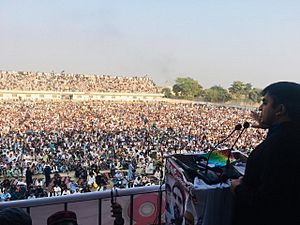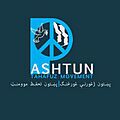Pashtun Tahafuz Movement facts for kids
|
پښتون ژغورنې غورځنګ
Pashtun Protection Movement |
|
 |
|
| Abbreviation | PTM |
|---|---|
| Motto |
|
| Type | Human rights movement |
| Purpose | Protection and rights of Pashtuns
|
|
Chairman
|
Manzoor Pashteen |
|
Formerly called
|
Mahsud Tahafuz Movement (From May 2014 until January 2018) |
The Pashtun Tahafuz Movement (PTM; Pashto: پښتون ژغورنې غورځنګ Paṣhtūn Zhghōrənē Ghōrźang; Urdu: پشتون تحفظ موومنٹ, lit. 'Pashtun Protection Movement') is a group that works for the human rights of Pashtun people. It is based in Khyber Pakhtunkhwa and Balochistan, regions in Pakistan. Eight students started the movement in May 2014 in Dera Ismail Khan. In February 2018, its name changed from "Mahsud Tahafuz Movement" to "Pashtun Tahafuz Movement."
Since February 2018, PTM has held many public events. They have asked the Pakistani government and military for several things. These include removing landmines from Pashtun areas. They also want to find people who have gone missing and bring them to court. Another demand is to investigate killings that happen outside of the law. The movement is led by Manzoor Pashteen, a human rights activist. Other important activists include Ali Wazir and Mohsin Dawar. PTM says it is a peaceful group that follows Pakistan's laws. The Pakistan Army and some journalists have said that PTM is trying to cause problems between different groups of people. Neighboring Afghanistan has shown strong support for the movement.
Contents
History of the Movement
How PTM Started
The idea of "Pashtunistan" has been a sensitive topic since Pakistan became independent in 1947. Many Pashtun people live in both Afghanistan and Pakistan. Some experts say that Pakistani authorities have focused on promoting Islam. However, PTM has not talked about Pashtun unity.
Pashtun areas have been affected by conflict since the 1980s. This was due to the Cold War and later conflicts. PTM works against war, blaming both Islamist groups and the Pakistani military for the damage.
The movement began as the Mahsud Tahafuz Movement in May 2014. Eight students in Dera Ismail Khan started it. Their main goal was to remove landmines from Waziristan. This area and others in the former Federally Administered Tribal Areas were badly affected by war.
PTM Becomes Well-Known
The movement became widely known in January 2018. This happened when they started seeking justice for Naqeebullah Mehsud. He was a young man who was killed by police officer Rao Anwar in Karachi. Many people joined the movement in February 2018. At that time, the name changed from "Mahsud" (a specific tribe) to "Pashtun." This showed it was for all Pashtun people.
Young people mostly lead the movement. It uses social media a lot because it doesn't get much attention from regular news channels. PTM has challenged military power in ways that other Pashtun groups haven't. However, as of 2018, PTM did not have a clear organization or a political plan.
In November 2018, PTM started a justice movement for Tahir Dawar. He was a police officer and poet who was killed. PTM asked for an international investigation into his death. In February 2019, PTM gained more international attention. This was after one of its leaders, Arman Loni, died in Loralai. Protests followed, and many PTM activists were arrested. In May 2020, after another PTM leader, Arif Wazir, died, more protests happened. Several activists were arrested then too. The Pashteen hat is a well-known symbol of PTM. Manzoor Pashteen often wears it at public events.
What PTM Wants
PTM has made several demands during its gatherings. These include:
Ending Violence and Landmines
The Pashtun Tahafuz Movement strongly demands that landmines be removed. These mines are in the Pashtun tribal areas. PTM leaders have criticized Pakistan's military for causing problems in Pashtun lands. They use a famous slogan: "Those in uniform are behind terrorism."
PTM also wants Rao Anwar and other police officers to be punished. They are accused of being involved in the death of Naqeebullah Mehsud. PTM also asks for a special group to be set up. This group would investigate all people killed outside of the law. They want missing persons to be brought to court. They also demand that people should not be taken away and held in secret places.
Protecting Pashtuns from Mistreatment
PTM demands that harsh punishments against whole villages and tribes must stop. This often happens after a violent event in Pashtun tribal areas. They also want to end the disrespectful treatment of local people at army checkpoints.
PTM Marches and Gatherings
Islamabad Sit-in
On January 26, 2018, PTM started a protest march from Dera Ismail Khan. Manzoor Pashteen began the march with 20 friends. Many more people joined along the way. The march went through several cities, reaching Peshawar on January 28. It then continued to Islamabad.
In Islamabad, a protest called "All Pashtun National Jirga" was held. This sit-in started on February 1 outside the National Press Club. The group spoke out against the killing of Naqeebullah Mehsud. They also spoke against what they called unfair treatment of Pashtuns. They asked the government to investigate Naqeebullah Mehsud's death. They also wanted investigations for other Pashtuns killed by police.
The jirga demanded an end to judging Pashtuns unfairly in Pakistan. They wanted missing Pashtuns to be brought to court. They also asked the Pakistan Army not to harm innocent people in tribal areas. Another demand was to stop collective punishments against villages. They also wanted an end to frequent curfews. A key demand was to remove all landmines from tribal areas. Protesters said that since 2009, over 35 people, including children, had died from landmines in South Waziristan alone.
The sit-in in Islamabad ended on February 10. PTM leaders said they would protest again if their demands were not met. A government advisor, Engr. Amir Muqam, met with protesters. He showed them a written agreement from Prime Minister Shahid Khaqan Abbasi. This agreement included arresting Rao Anwar and speeding up mine clearing. It also promised to address other concerns. Muqam praised the peaceful protest.
On May 13, 2018, families of missing Pakistanis joined a PTM protest. This rally was held in Karachi. They held photos of their missing relatives.
Public Gatherings
PTM has held many public protests. These have taken place in various cities across Pakistan. Some of these cities include Bajaur, Bannu, Karachi, Lahore, and Peshawar. They have also held events in several Western countries. These include Belgium, Denmark, France, Germany, and the United States.
Media Coverage Issues
Mainstream news channels often do not show PTM's events. This is because they are not allowed to by powerful groups. So, social media is the main way PTM shares its message. This also shows that the system often ignores PTM.
On March 23, a PTM meeting was planned at Peshawar University. However, officials banned political meetings there for 30 days. The meeting then took place in Baghi-e-Naran, Hayatabad, with about 200 people attending.
The movement's song is "Da Sanga Azadi Da?". This means "What kind of freedom is this?". Many Pashtuns feel this song expresses their feelings. It talks about their problems caught between militants and the military.
On April 26, 2019, Mohsin Dawar tweeted that he and Ali Wazir were stopped from holding a press conference. This was at the National Press Club (NPC). Many politicians criticized the NPC for this. The next day, NPC said the lawmakers had not booked the room. A Pakistan Army spokesman, Major General Asif Ghafoor, told a journalist not to invite PTM members on TV. On April 29, 2019, Asif Ghafoor said PTM would no longer be tolerated.
Images for kids



